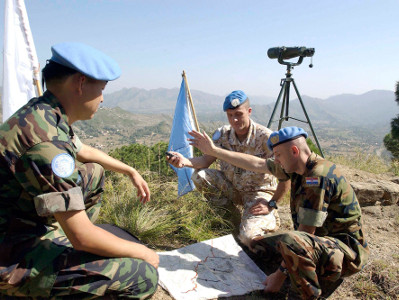Professionalism in Peacekeeping: In Multinational Missions, Preparation and Discipline Are Key
Military professionalism has three main characteristics: responsibility, corporate unity and expertise, writes Col. Emmanuel Kotia, Ph.D, Chief Instructor at the Kofi Annan International Peacekeeping Training Centre in Accra, Ghana. These should be at the core of all military functions. Their importance in peacekeeping dates back to 1948 when the military played a central role in the United Nations Truce Supervision Organization in the Middle East, the first modern peacekeeping mission. Today, the U.N. leads 16 peacekeeping operations worldwide. All depend on the efforts of professional soldiers.
Although much has been written about professionalism in national militaries, relatively little has been written about professionalism in peacekeeping. This is a vitally important issue because a single unethical or undisciplined act by a peacekeeper can damage the effectiveness of an entire mission.
Military leaders have learned a number of lessons on professionalism and operations as a result of the deployment of troops in the U.N. Mission in Liberia and the U.N. Interim Force in Lebanon (UNIFIL). The lessons, in Dr Kotia's Opinion, are that planning is essential, discipline must be enforced, local culture must be respected, and equipment must match the mandate.
Regarding local cultures Kotia writes:
"Gross negligence of or lack of understanding of cultural practices has serious consequences for peacekeepers. In Lebanon, for instance, religious sensitivity dictates that no male should have any direct communication or contact with a female in public. Women are generally regarded with extreme dignity in that part of the world. Also, open drinking or selling of alcohol in southern Lebanon is forbidden, according to Islamic tradition. There have been some isolated incidents in Lebanon in which peacekeepers have violated these cultural practices, resulting in retaliatory threats or attacks by militia groups. Although some of these situations have been resolved through dialogue and negotiations, this is a potentially explosive area that can restrict the operations of peacekeepers and affect professionalism and discipline. The solution is to educate peacekeepers on cultural norms and practices before they are deployed. Disregard for the cultural practices of the people will generate hostility. In peacekeeping, understanding and coping with the sensitivities of the people should be a key measure of the professionalism of peacekeepers."
To read the full article, click here.
